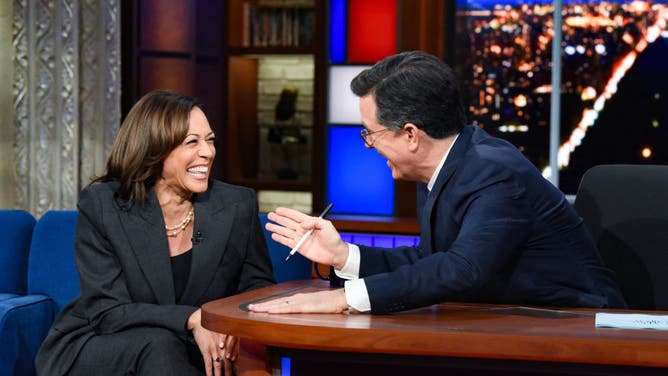Research Shows 98 Percent Of Late-Night 'Jokes' Target Donald Trump: Report
Media Research Center reviewed every joke told on late-night television from September 3 through October 25. To conduct the study, the researchers assessed 136 episodes of the following five shows:
Comedy Central’s The Daily Show, ABC’s Jimmy Kimmel Live, CBS’s The Late Show with Stephen Colbert, and NBC’s The Tonight Show Starring Jimmy Fallon and Late Night with Seth Meyers. (The research did not include Gutfeld, which airs at 10 pm ET on Fox News.)
MRC found a total of 1,463 jokes about the two candidates running for president. Of these, 1,428 of the jokes were targeted at Donald Trump. Meaning, just 35 were told about Kamala Harris.
That's a ratio of 40:1, or almost 98 percent to 2 percent.
"In addition to the 1,428-35 Trump-Harris split, analysts also found that the comedians told 302 jokes about the vice presidential candidates. Of these, 236 were directed at J.D. Vance compared to 66 at Tim Walz. That equates to a 4:1 ratio with 78 percent aimed at Vance," MRC notes.
Combined, 1,664 of the 1,765 of the jokes (94%) targeted the Republican ticket.
"Over the same time span, the comedians also welcomed 44 liberal celebrity, journalist, and political guests compared to zero conservatives. Those included one Colbert interview with Harris, two — one Kimmel and one Daily Show — with Walz, and one Kimmel with Doug Emhoff," the report adds.
Coming into September, liberals accounted for 94% of all late-night guests.
At this point, we know what late-night television is: an extension of the legacy media; a somewhat comedic form of left-wing propaganda.
We emphasize the term "somewhat" because, other than Jon Stewart (who only hosts The Daily Show on Mondays), the current batch of late-night hosts are not all that funny.
They are preaching, screechy, and unoriginal.
But we give Jimmel Kimmel a pass. He's struggling. Last week, Kimmel told MSNBC he admitted to his wife that he could not bring himself to accept that Donald Trump might win the election.
"I was telling my wife, I don’t feel like I’m mentally prepared for the possibility of a loss [for Kamala]. I’m not ready. I have to get there."
What's Colbert's excuse?

The Late Show with Stephen Colbert and guest Sen. Kamala Harris during Thursday's November 21, 2019 show. (Photo by Scott Kowalchyk/CBS via Getty Images)
Interestingly, a victory for Kamala would require a complete overhaul of the late-night industry. The programs survived the Biden years because Trump announced he was running for president in 2022, and Colbert, Kimmel, and Fallon fixated on Jan. 6 for nearly 24 months.
Trump says he won't run again in 2028. While he would likely remain in the news in some form, whatever presence he'd have wouldn't warrant the current rate of 90% of all "jokes."
Given that Colbert and the Jimmys are unwilling to even modestly poke fun at Harris, a Trump loss could prove doom for the future of late-night. Also, a pivot back to the pre-Trump days of less politically focused programming would be challenging after eight years of hyper-partisan content.
Granted, the state of late-night is already murky. According to Axios, ad revenue for the top five late-night shows is down more than 60% from 2016.
The programs require hefty investments in talent salaries and production costs, but no longer provide lucrative returns. Notably, CBS canceled The Late Late Show last year after a 30-year run as it started to lose, on average, $20 million a year.
Trump might be the only topic keeping late-night from an utter collapse.
Put simply, late-night television is better off with a Trump victory – as are the rest of us.